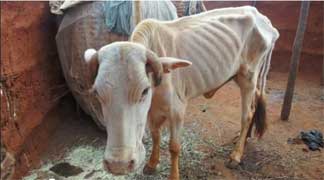
Cattle are staving, photo courtesy of www.worldvision.org
The international satellite communications sector has applauded the Ethiopian government’s recent decision to strategically liberalize its VSAT market, and it is encouraging the national administration to continue to implement regulatory reforms that facilitate cost-effective delivery of Internet, voice and data communications needed for famine relief and other vital services.

David Hartshorn, Secretary General of the Global VSAT Forum
The satellite sector statement was made following a series of GVF meetings with the Ethiopian Administration in Addis Ababa and in response to the recent formulation of “Private VSAT Permit Directive Number 2/2003” by Ethiopia’s Ministry of Information and Communication Technology (MICT), which will permit authorized companies to use VSAT services to transmit and receive voice, data or images via satellite and within closed user groups.

Children are fragile and suffering photo courtesy of www.worldvision.org
“Financial sustainability is always a major challenge, and licensing fee levels are an important factor in determining the success or failure of communications enterprises,” said Matthew Botwin, Chairman of the GVF Regulatory Working Group. “Our sector looks forward to continuing our dialogue with the Ethiopian Administration so that we can more fully realize our shared objectives in this important collaboration.”
Ethiopia’s Directive is designed to enable authorized telecommunications service providers to “support development efforts of government projects, private investors and local communities”. As such, it represents an important opportunity, not only for delivery of corporate enterprise applications, but also for provision of connectivity in remote and underserved areas of the nation.
The satellite communications and humanitarian sectors have been working closely to leverage VSAT-enabled solutions for support of famine-relief efforts underway throughout the Horn of Africa. The Ethiopian government’s decision to liberalize VSAT service provision creates the possibility for those efforts to save lives and rebuild communities in remote locations, whilst improving access to communications for enterprises throughout the country.

